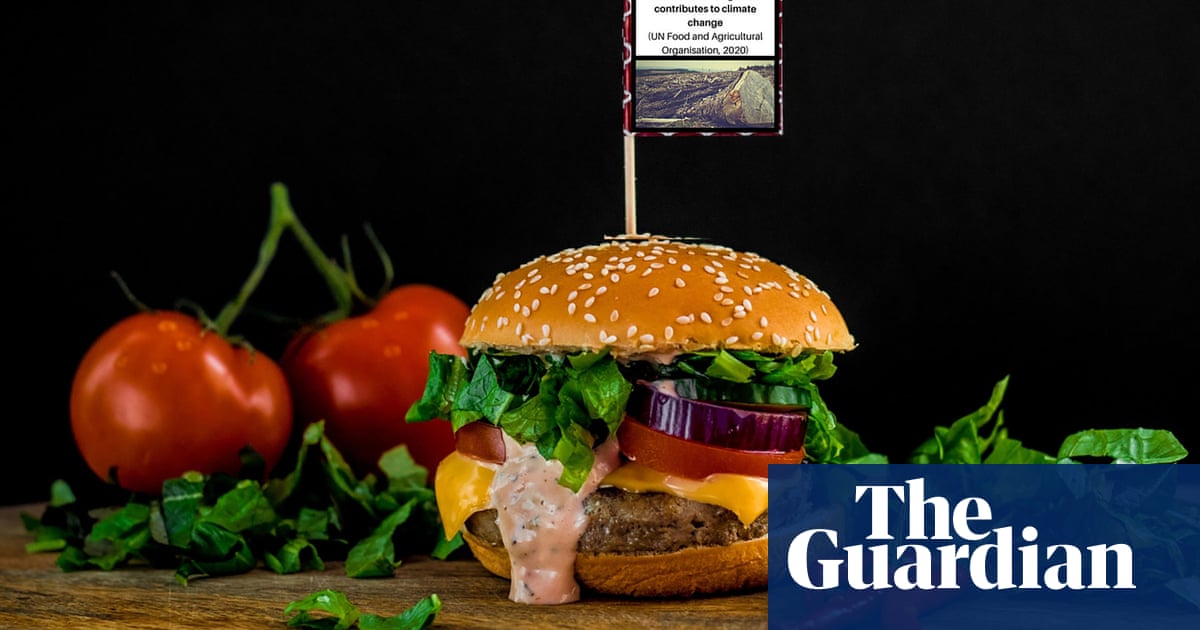People are used to seeing stark warnings on tobacco products alerting them about the potentially deadly risks to health. Now a study suggests similar labelling on food could help them make wiser choices about not just their health, but the health of the planet.
The research, by academics at Durham University, found that warning labels including a graphic image – similar to those warning of impotence, heart disease or lung cancer on cigarette packets – could reduce selections of meals containing meat by 7-10%.
It is a change that could have a material impact on the future of the planet. According to a recent YouGov poll, 72% of the UK population classify themselves as meat-eaters. But the Climate Change Committee (CCC), which advises the government on its net zero goals, has said the UK needs to slash its meat consumption by 20% by 2030, and 50% by 2050, in order to meet them.
“how can we shift responsibility to the consumer today?”
Eh, in all fairness the meat & dairy industry is one thing that we as consumers really do need to take a bulk of responsibility for. I say that as a devout meat eater.
BUT, governments could go a long way by not subsidising dairy and meat and instead subsidising protein alternatives. It’s fucking nuts to me that it costs more for me to buy plant protein.
(Before the die hard vegans come at me saying you don’t need to eat pseudo (plant) proteins to eat less meat, please remember you’re trying to convert people that are familiar and enjoy one diet to another. You’re not going to encourage anyone by advocating a cold-turkey or 0% meat approach. I hate that I have to put this disclaimer here, but I’m fed up with arguing with puritanical vegans that overshadow pragmatism.)
No, we don’t.
Please focus on curbing your own satisfaction, so the oil industry can continue to be the biggest polluter AND make money hand over fist.
Since around 2018 we have known that agriculture, specifically the raising of cattle, spews out more harmful emissions than the oil industry does.
😂 mind adding a source for that?
Any study that also includes indirect greenhouse gas emissions such as methane, and not just CO2.
There are NO emissions from cattle at all! Cattle eat grass, then fart, then “emissions” precipitate and new grass grows up. It’s a closed loop. And since it’s a closed loop, there are zero emissions. Emissions only happen when you dig up oil, burn it and it and your smoke doesn’t get converted back to oil.
Thanks for giving me the dumbest shit I’ve heard today.
Lolwut?
It doesn’t.
Go with eco-friendly cement and enforce car pooling. That would have far better effect than meat consumption.
Eyup… Energy, construction and transport contributes the most, with energy being the mother of all emissions:
The right way to read that chart is “20% of emissions is in making energy for people, 70% of emissions is making energy for literally everything else”. If you consider that my other major personal sources of emissions are driving, domestic heat/hot water, and electricity, that’s saying 1/5 of my personal emissions are just from what it takes to provide my food.
But meat is damaging for more reasons than emissions. It’s also a major source of excessive water consumption, land use, antibiotic resistance, and pollution of potable water sources (runoff from excrement and chemicals used in the production of food for livestock, which is actually the majority of food grown…which is another reason…it’s just inefficient AF. Our food eats way more food than we do, and almost all necessary micro and (and all macronutrients) are available directly from the plants anyway.
I’m not saying we all need to be plant based, but the typical American diet is far too focussed on the meat. It’s practically heresy to go a meal without consuming the flesh or excretions of at least one beast. Simply put I think it’s unsustainable to continue consuming meat at this rate, and literally impossible to change the meat industry to grow meat more ethically and sustainably (as in, there isn’t enough arable land in the world to sustainably and “ethically” (in the modern sense of free range/pasture raised-and-finished, limited antibiotic use, etc) grow meat at the rates we are consuming it. I think it’s more immediately achievable to change that attitude and reduce consumption first and foremost.
Also I do agree that roads should be made of more sustainable materials (though improving mass transit would be an even bigger win, IMO. Make sections of cities car-free (save for emergency services, local deliveries, trash pickup, busses, etc) easily accessible and interlinked by mass transit and park-and-rides from the suburbs. Make most commutes by train/subway faster and easier than driving and people will switch. Bikes and scooters available at every stop. Make employers provide transit and bike/scooter passes. Incentivize employers having hybrid and WFH environments. So much stuff we could be doing, but tearing up or paving over roads that still have useful life left in them shouldn’t be among them.
That’s all false though.
We need to do all of it, it’s not an either-or. That luxury is long gone.
Cattle don’t have any impact though.
That’s a weird take. Methane emissions are one impact, land use change another. There are even studies arguing in both directions.
Meat production is a main driver of rainforest deforestation. All three of these claims are well documented and easily searchable.
So either way, it’s evidently wrong to say cattle don’t had any impact.
There’s no rainforest in the UK.
YOU WILL EAT THE BUGS
…or plants.
No







